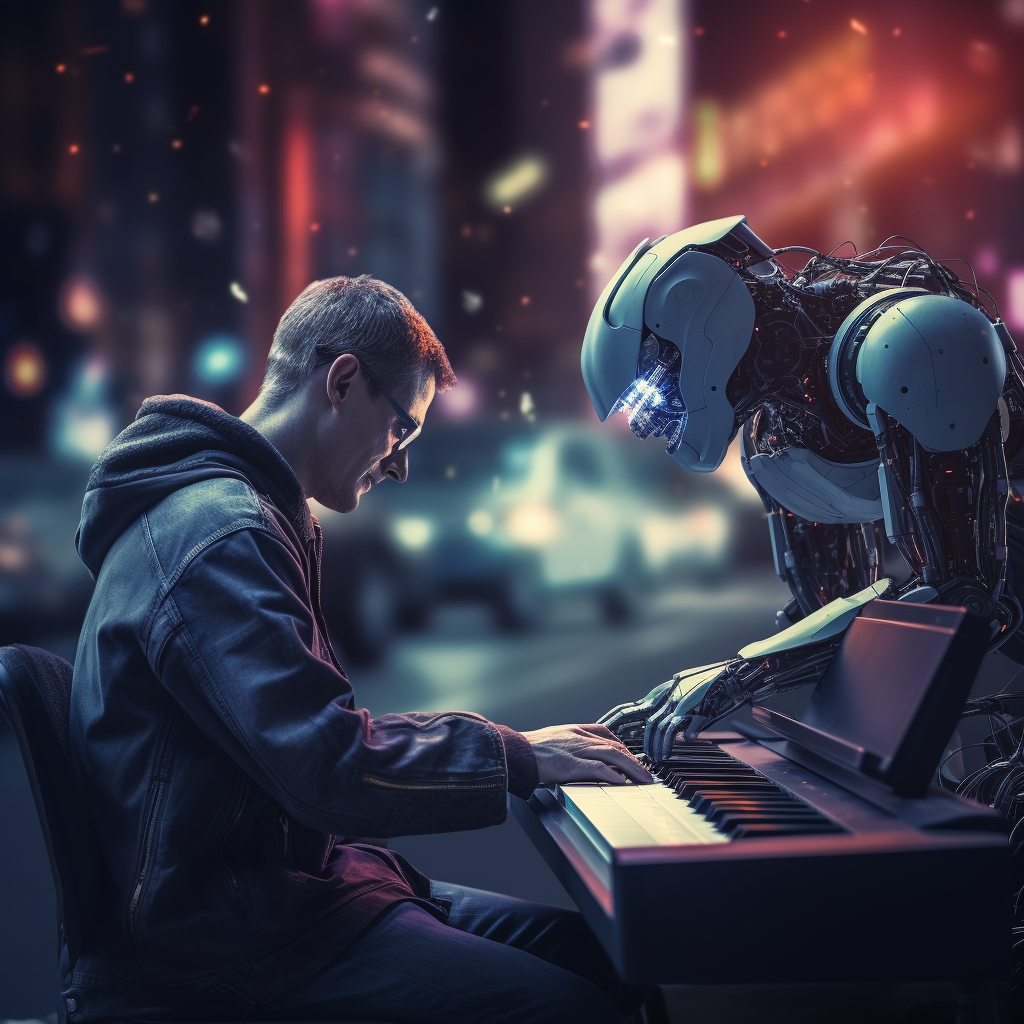Opportunities for Music and AI – Striking the perfect chord or hitting a sour note?
Let’s discuss creative AI in the arts, including poetry, literature, screenplays, and the visual arts. Let’s focus on its role in music, involving singers, orchestras, podcast narration, or simple voice emulation.
Creative, generative AI is already present and can do all of the above if programmed well. Although examples are everywhere, they are mainly for amusement at the moment. Yet, as professionals start earning from it, doubts are being cast as to its use. Professionals like Holly Herndon, a Berlin-based, American musical artist who uses uses artificial intelligence to transform her image and singing voice. Governments and the public want assurances that our face, voice, or work will only be gathered from our digital footprints with our knowledge.
Let’s take the music industry and all its connotations.
Right now there are at least 10 different music AI models, and people are already releasing their AI music for free online. AI can use any bits from TikTok, films, or even “Joe”, in his room, singing along to the Beatles album. This is where ethical AI comes in. How do we hope to cover the complex world of royalty fees? Royalty fees are a minefield at the best of times, making sure everyone gets their due, and now that music-making is in the hands of virtually everyone, the concern is making sure AI is adhering to copyright laws, sampling laws and mixing Laws.
There are two avenues for music creators to harness the power of AI-generated music.
The first approach is straightforward: when a company acquires rights to a vast music catalogue, it grants users the freedom to utilise this music without copyright concerns.
The second method caters to musicians and composers. On these platforms, you gain access to original music content, purchasing the rights to each piece for a specified fee, which can vary depending on the artist. This model operates on the principle that the creator holds primary copyright authority, surpassing other artists and publishers associated with the music piece.
However, there is still a large amount of work to be done to cover everyone’s rights, especially in light of the new sync and play music of today.
With tools like Voicify.ai, any legendary singer of the present or the past can be made to sing virtually any song through AI models. These models can be trained by users through reference tracks. Voicify AI acknowledges the importance of their AI being used for personal and not commercial purposes. Their terms and conditions underscore respect for copyrights, prohibiting any infringement. They clarify that their synthetic vocal models, while resembling public figures, are entirely artificial creations, avoiding any association with endorsement.
But how do the artists feel about AI music? Some, like Tom Hanks, see it as a chance for them to get their talent to live on forever despite calling out deep fakes made without permission; some are happily selling their voice, like the artist Grimes, for a cut of the profits. Grimes suggested a 50% split in royalties. Others, like Dolly Parton, simply say “no”. She rejects the idea of having her music played by AI holograms, mentioning that she doesn’t want to keep her soul “grounded” here on Earth.
On a creative note, there is no doubt that AI’s learning speed far outweighs ours, which, on the plus side, means it may soon, one day, be able to accurately find the creator of anything on the web. No matter how small the sample is, it may be able to ensure the correct creators get their royalties. Could this be an opportunity for blockchain and generative AI to work together?
‘While the workability and effectiveness of these new models can only be tested with time, it is interesting to note that they are being viewed as viable alternatives in an industry that has traditionally been skewed to favour big record labels and corporations more than artists. Retaining ownership over their music while also being able to access better downstream revenue certainly shifts the power dynamic in favour of artists.’
Spicyip.com
But is this ethical? And is it ethical if the artist is a dead artist (Michael Jackson, for example) and if AI were to bring them back to life in the virtual world? When replicating concerts with old or new music, any royalties or credit would most likely go to the artist’s estate, without taking into consideration some companies, musicians, sponsors, or the publishers of the original concert from which the majority of the material for a virtual, AI-copy show was gleaned.
Spotify’s algorithms are already reshaping how music is valued in monetary terms.
What struck us at Enrapture when diving into this topic is how every new leap in human creativity, from a simple synth to creative AI, has made us worry about the impact it will make on the music industry. Yet the evidence suggests that, once it becomes thought of as a new tool for the musicians’ toolbox (like the synthesiser), great leaps will be made in the human creation of music.
When any new technology comes along, there is always a furor about the loss of jobs, the dangers to creativity, and the lack of talent. This happened when the synthesiser was invented back in the day, which was outlawed by the Musicians Union for a while as a threat to the music industry.
Our argument is that once all the teething problems of any earth-shattering breakthroughs subside, then the real experts will shine through. Music makers and immersive show creators will rise above the din of millions of people having fun using AI, and the real talent in music will truly amaze us.
Over the years, some of our current team members at Enrapture have hosted virtual events involving music. The ones we enjoyed the most were the Christmas shows, which range from nativity plays set in Bethlehem to pantomimes and discos to full-blown Las Vegas-style shows.

In one of the most memorable shows, which was set in a giant magical cave, avatars booked tables to view a Michael Jackson and Whitney Houston tribute duet with incredible live tribute artists. The collaboration allowed them to create a Vegas-like show with extravagant lights and clothes, as a beautiful gospel choir backed the tracks.
If you liked this article, explore Enrapture, an innovative tech company in the heart of Europe, focused on virtual-world content and experience creation, Metaverse development (3D Design, VR, XR), and consultation. We partner with brands across different industries, creating Branded Worlds for the new generations, Metaverse Healthcare Simulations, immersive Metaverse Music Experiences, captivating 3D Shopping Experiences, and cutting-edge AI Workrooms.

